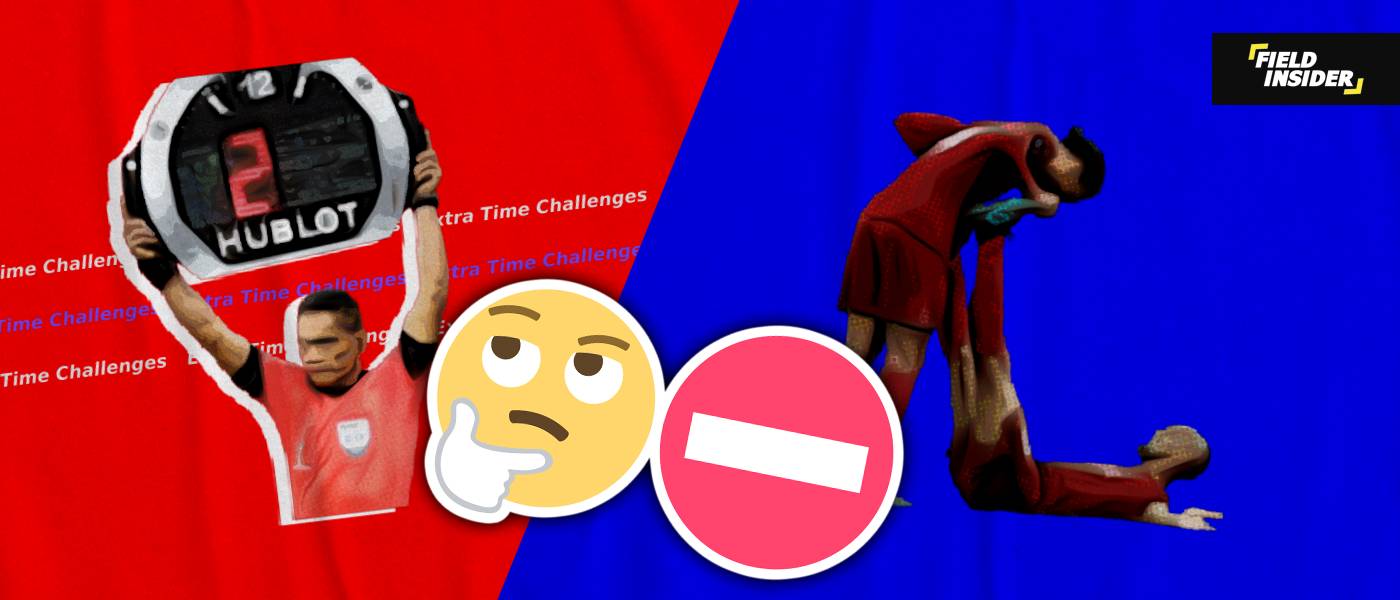Why Do Footballers Suffer From Muscle Cramps In Extra Time?
In the high-energy world of football, the occurrence of muscle cramps, especially during the intense moments of extra time, is a common challenge. These crucial periods in a match, often decisive in determining the outcome, are frequently disrupted by the sudden onset of muscle cramps.
This article delves into understanding the causes of cramps, the unique challenges they present in extra time, and effective strategies for prevention. This insight is crucial for everyone in the football arena, from young aspirants in youth football to experienced professionals.
Key Takeaways
| Categories | Details |
|---|---|
| Cramps in Football | Common in extra time, significantly impacting players’ performance. |
| Science Behind Cramps | Caused by dehydration, electrolyte imbalance, and muscle fatigue. |
| Challenges in Extra Time | Increased physical and mental demands heighten the risk of cramps. |
| Role of Preparation | Essential strategies include hydration, electrolyte balance, and conditioning. |
| Real-Life Examples | Case studies of footballers with cramps and their coping strategies. |
| Strategies for Coaches and Players | Emphasizes substitution strategies, training methods, hydration, and nutrition. |
| Importance of Prevention | Prioritizing preparation and hydration is crucial for peak performance in crucial moments. |
Muscle Cramps in Football
Common Occurrence in Extra Time
Cramps are particularly prevalent during the extended periods of play in football. Extra time, with its added intensity and duration, pushes players beyond their regular physical limits, often leading to muscle cramps.
This phenomenon is not just painful but can critically impact a player’s ability to contribute effectively during these crucial moments.
Impact on Players’ Performance
When a player experiences a cramp, their mobility and effectiveness on the field are significantly compromised.
This can lead to a reduced ability to maintain formation, execute strategic plays like the 4-3-3 formation or 5-3-2 formation, and respond quickly to the opposing team’s actions.
Importance for Teams and Coaches
Understanding and managing cramps is vital for team strategy. Coaches need to recognize the signs early and make timely decisions.
This includes tactical decisions like substitutions and adapting team formations, especially in critical match situations like those in the UEFA Champions League.
Science Behind Muscle Cramps
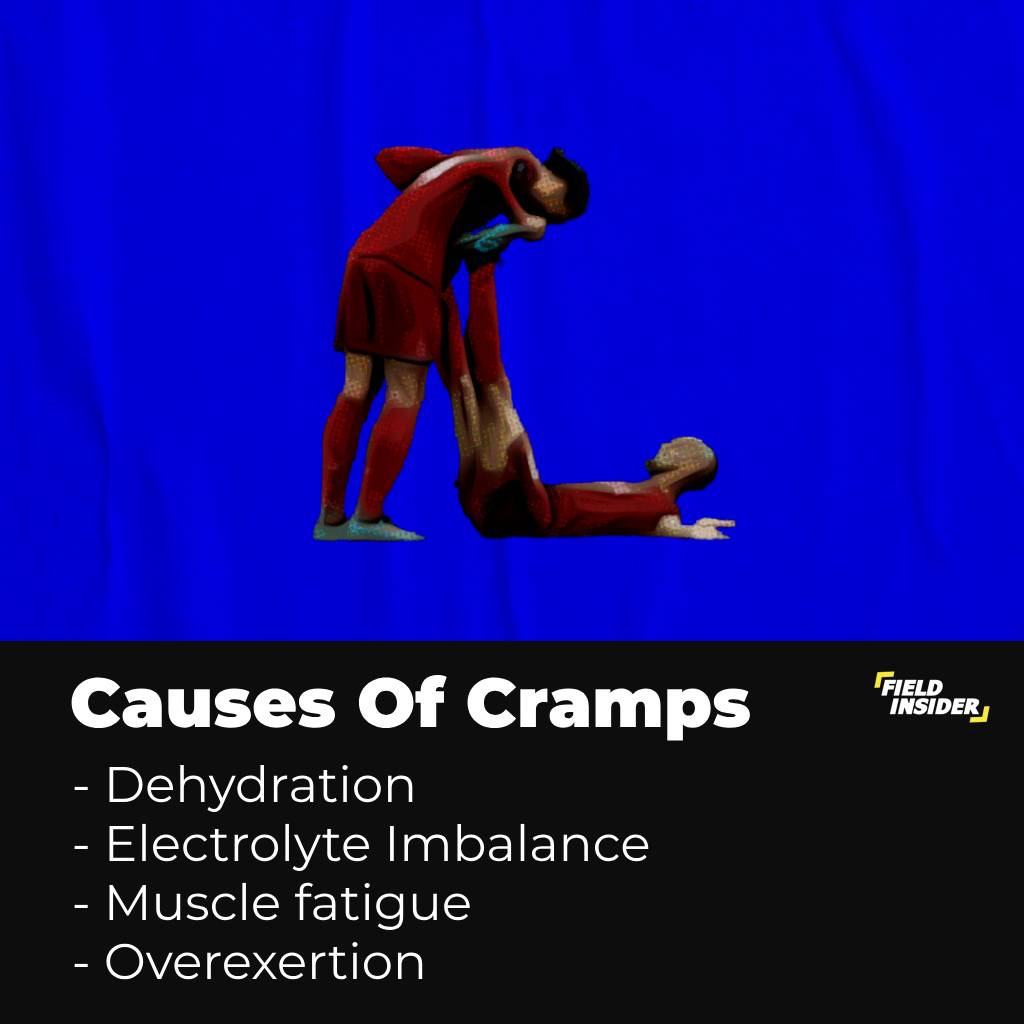
Dehydration
Dehydration reduces muscle efficiency and increases the likelihood of cramps. In football, where players are constantly on the move, maintaining hydration is challenging but essential.
Strategies for effective hydration before and during the game are crucial, as detailed in Prepare for Football Matches.
Electrolyte Imbalance
Electrolytes like sodium and potassium are crucial for muscle function. An imbalance can lead to involuntary muscle contractions or cramps.
Footballers need to ensure they’re getting enough electrolytes in their diet, perhaps supplemented by sports drinks, as discussed in Energy Drinks in Football.
Muscle Fatigue
Prolonged physical exertion leads to muscle fatigue, a prime factor in cramps. The high-intensity nature of football, especially during extra time, exacerbates this issue.
Adequate training and fitness regimes are key to building endurance, as seen in Physical Training in Football.
Challenges in Extra Time
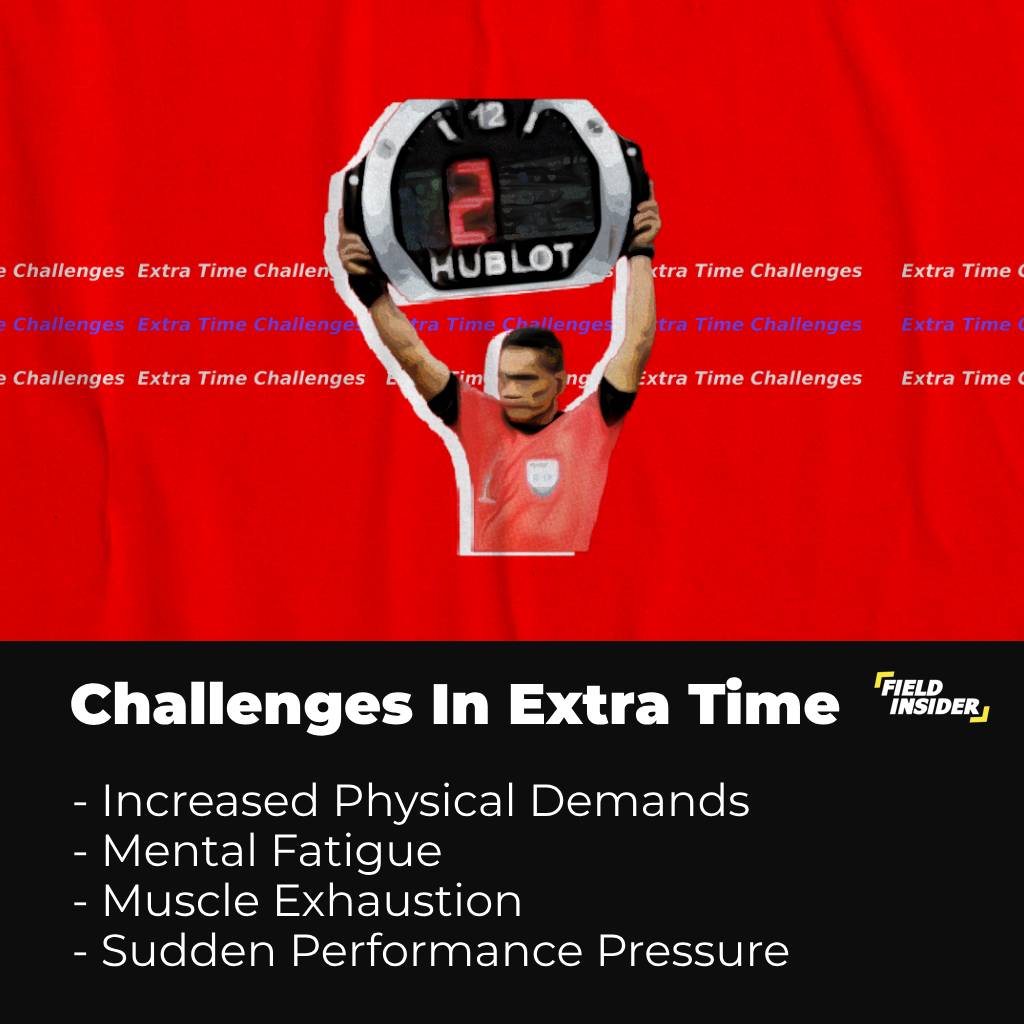
Increased Physical Demands
The additional minutes in extra time mean prolonged physical exertion, increasing the likelihood of muscle fatigue and cramps.
Players must have exceptional fitness levels to cope with these demands, akin to what is required in intensive formations like 7-a-side Formations.
Mental Stress
Extra time is not just physically demanding but also mentally taxing. The high-pressure situation can lead to stress-induced muscle tension, further heightening the risk of cramps.
Adaptation to Extended Play
Players must be conditioned not just for the standard 90 minutes but for the possibility of extra time. This involves not only physical training but also mental preparation, as discussed in Mental Health in Football.
Role of Preparation
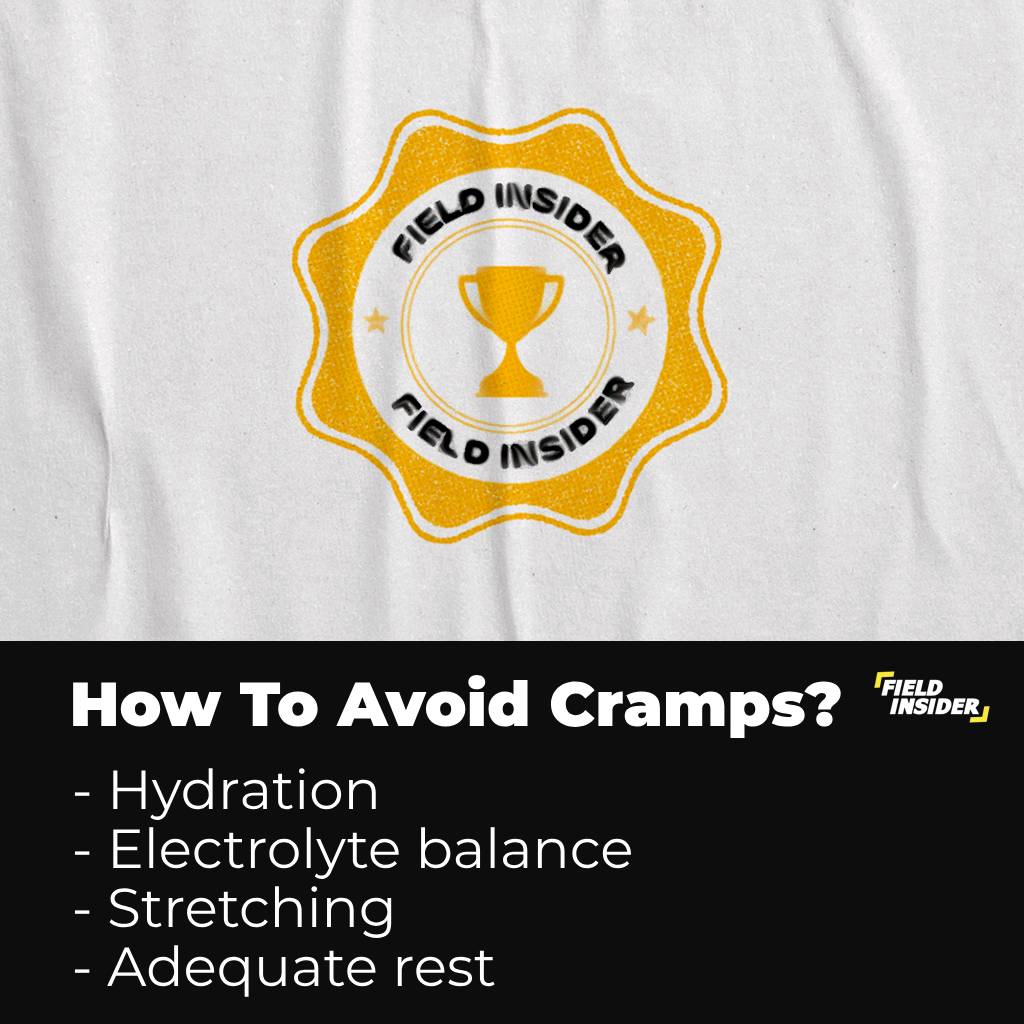
Hydration Strategies
Implementing effective hydration strategies is crucial. Pre-match hydration, as well as consistent fluid intake during the game, are key to preventing dehydration-related cramps. More on this can be found in Football Training.
Electrolyte Management
Balancing electrolyte intake through diet and supplements is essential for muscle function. Players might need to consider specific dietary adjustments or the use of electrolyte supplements.
Conditioning and Fitness
Regular, targeted training helps build muscle endurance, reducing the likelihood of fatigue-induced cramps.
Recovery routines are also vital, as they allow muscles to heal and strengthen, preparing players for the high demands of extra time.
Muscle Injuries in Professional Football
Fifty-one football teams, comprising 2,299 players, were followed prospectively during the years 2001 to 2009 for a study concerning muscle injuries in soccer.
The study, “Jan Ekstrand, Martin Hägglund and Markus Waldén, Epidemiology of Muscle Injuries in Professional Football (Soccer), 2011, American Journal of Sports Medicine“, concluded the following;
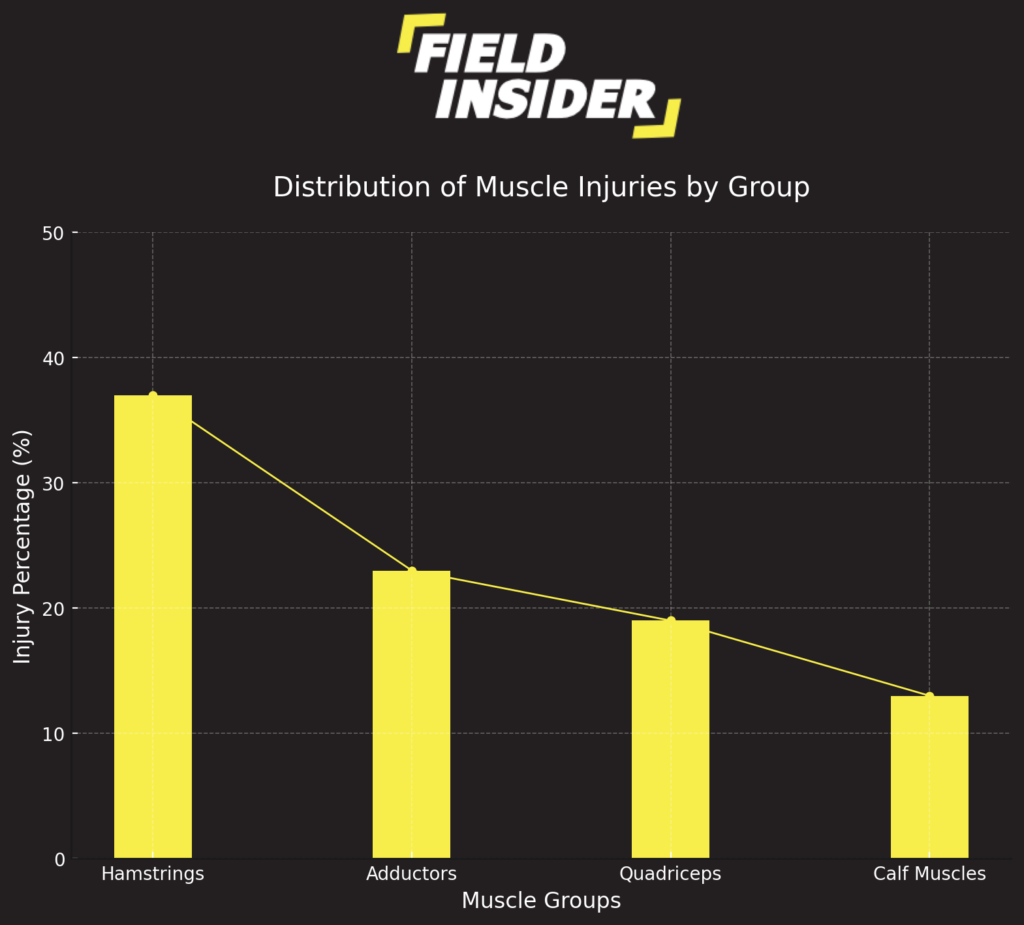
The bar graph presents the distribution of muscle injuries across four major groups as follows:
- Hamstrings: This group has the highest percentage of injuries at approximately 37%.
- Adductors: The second most commonly injured group with about 23%.
- Quadriceps: This muscle group accounts for roughly 19% of the injuries.
- Calf Muscles: They have the lowest among the specified groups at approximately 13%.
Real-Life Examples
Case Studies in Professional Football
There are numerous instances where cramps have affected players in crucial matches. Analyzing these cases provides valuable insights into the causes and management of cramps.
World Cup Matches
During the 2014 World Cup, high temperatures and humidity led to several players experiencing cramps. Robin van Persie of the Netherlands was notably affected in the match against Costa Rica.
Champions League Finals
The UEFA Champions League Final is demanding, and in the 2018 final, Dani Carvajal of Real Madrid suffered a hamstring injury possibly initiated by cramps, causing him to be substituted early.
Copa America
In this tournament often held during the Southern Hemisphere’s summer, players, including Lionel Messi, have experienced cramps, potentially due to intense play and shorter recovery times.
Euro Championships
The Euro 2016 saw players like Jerome Boateng from Germany facing cramps during the prolonged matches that reached extra time.
Strategies Used by Top Athletes
Elite footballers often have specific routines and strategies to cope with and prevent cramps. Their approaches, ranging from diet to on-field tactics, offer practical examples for players at all levels.
Here are some real-life examples of the methods employed:
Hydration Strategies
- Cristiano Ronaldo: Known for his meticulous attention to his body, Ronaldo follows a strict hydration regime that includes electrolyte-rich drinks before, during, and after games to prevent cramps.
- Tom Brady: Though not a footballer but an elite athlete, Brady is famous for his hydration method where he drinks electrolyte-infused water throughout the day to maintain muscle function and prevent cramps.
Nutrition and Supplements
- Lionel Messi: After struggling with frequent muscle issues early in his career, Messi worked with nutritionists to adjust his diet. He incorporated more fresh fruits and vegetables to increase his intake of vitamins and minerals, which can help in preventing muscle cramps.
- LeBron James: He reportedly uses cramp-prevention supplements and a diet high in potassium and magnesium, which are essential for muscle health.
Conditioning and Fitness
- James Milner: The Brighton midfielder is renowned for his extraordinary fitness levels, which he maintains through rigorous pre-season training that prepares his muscles for the demands of the season, thereby reducing the risk of cramps.
- Gianluigi Buffon: The veteran goalkeeper has often spoken about the importance of post-match recovery sessions, including ice baths and massages, which help to prevent muscle fatigue and cramps.
On-Field Tactics
- Andres Iniesta: The former Barcelona midfielder was known for his ability to pace himself during games, conserving energy and reducing the risk of cramps, especially during long matches or extra time.
- Zlatan Ibrahimovic: Despite his size and physical style of play, Ibrahimovic has managed to avoid frequent cramps, which some attribute to his martial arts training that improves flexibility and muscle endurance.
Medical and Technological Assistance
- Bayern Munich: The club uses GPS tracking systems during training to monitor players’ workload and adjust training intensity to prevent overuse, which can lead to cramping.
- Arsenal FC: Arsenal has employed a team of sports scientists who use data analytics to tailor fitness programs for each player, reducing the incidence of cramps and muscle injuries.
These examples demonstrate that top athletes rely on a holistic approach to cramp prevention, combining advanced science with traditional fitness and nutritional wisdom.
Immediate and Long-Term Coping Mechanisms
The immediate response to cramps on the field, and the long-term strategies to prevent them, are both critical. These include on-the-spot stretches, strategic substitutions, and comprehensive conditioning programs.
Strategies for Coaches and Players
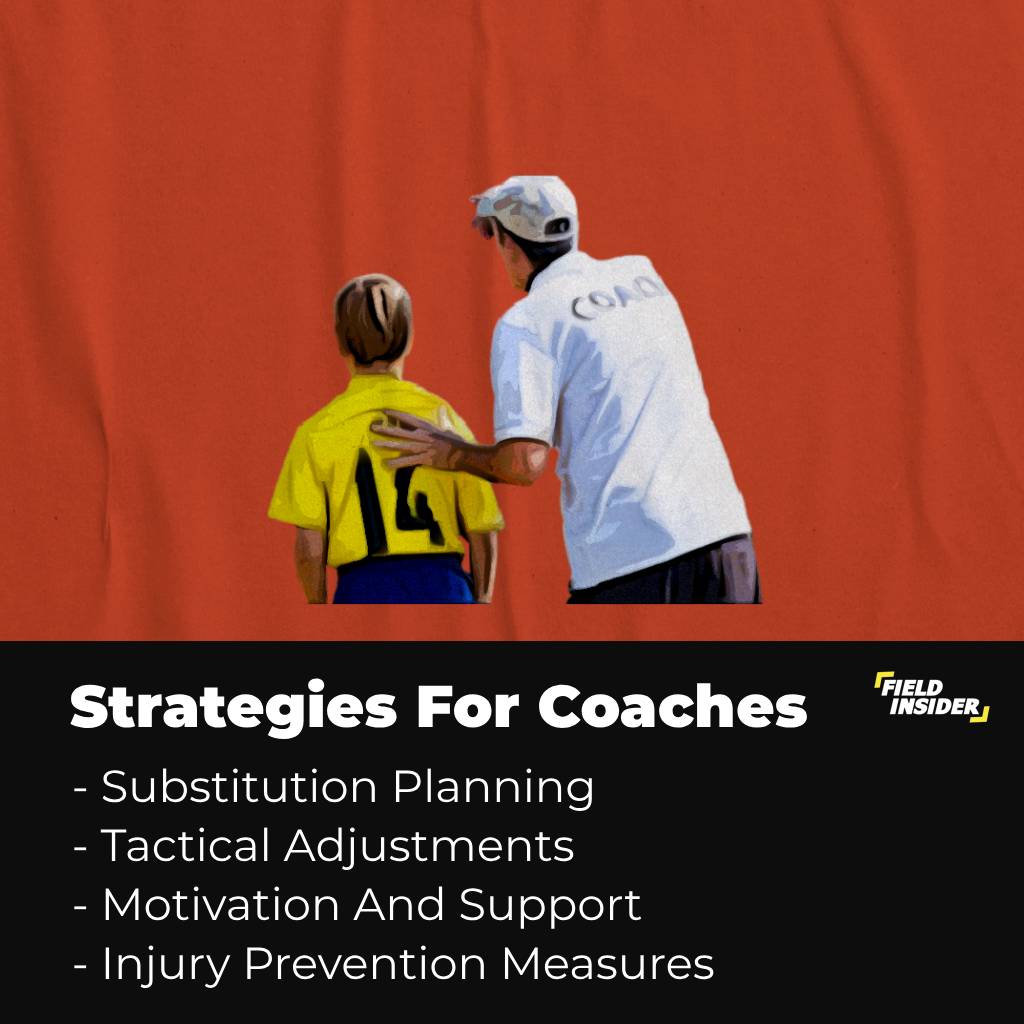
Coaching Tactics
Coaches play a crucial role in managing cramps. This includes tactical decisions like substitutions and adapting team formations, possibly shifting to less physically demanding setups like the 4-4-2 formation in response to player fatigue.
Player-Centric Prevention Plans
Players should have personalized plans for hydration, nutrition, and fitness. Tailoring these aspects to each player’s specific needs can significantly reduce the risk of cramps.
Training and Nutritional Guidelines
Incorporating specific training routines focused on endurance and strength, along with a balanced diet rich in essential nutrients, is fundamental.
Importance of Prevention
Prioritizing Preparation
Teams and players must prioritize preparation for the physical demands of extra time. This involves comprehensive training programs, dietary plans, and hydration strategies.
Enhancing Performance in Crucial Moments
By effectively preventing cramps, players can maintain their performance levels during the most critical phases of the game, ensuring they are at their best when it matters most.
Long-Term Health and Career Longevity
Preventing cramps is not only about immediate performance but also about the long-term health and career longevity of the players. Regular conditioning, proper nutrition, and adequate recovery are essential in this regard.
Conclusion
In sum, the battle against cramps in football, particularly in the demanding extra time, is crucial for optimal player performance and team success. Key elements like hydration, electrolyte balance, and conditioning play a pivotal role in prevention.
Both players and coaches need to adopt tailored strategies, drawing insights from professional experiences. Addressing cramps effectively enhances not only immediate performance in crucial game moments but also supports long-term player health and career longevity.


